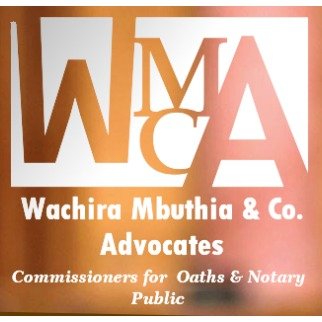Best Housing, Construction & Development Lawyers in Nakuru
Share your needs with us, get contacted by law firms.
Free. Takes 2 min.
Free Guide to Hiring a Real Estate Lawyer
List of the best lawyers in Nakuru, Kenya
About Housing, Construction & Development Law in Nakuru, Kenya
Nakuru, one of the fastest-growing cities in Kenya, is experiencing significant development in housing, construction, and infrastructure. With its burgeoning population and strategic location within the Great Rift Valley, Nakuru has become a focal point for real estate investments and construction projects. Housing, Construction & Development Law in Nakuru is governed by a range of regulations aimed at ensuring orderly urban development, proper land use, and the safety and sustainability of construction practices.
Why You May Need a Lawyer
Engaging a lawyer in the field of Housing, Construction & Development can be essential for navigating the complexities of property and construction law in Nakuru. Common situations where legal assistance may be beneficial include:
- Disputes over land ownership or property boundaries.
- Issues related to construction contracts and contractor performance.
- Compliance with local zoning laws and building regulations.
- Negotiations and litigation involving real estate transactions.
- Addressing claims related to property defects or construction mishaps.
- Guidance on funding and development projects, including obtaining permits.
Local Laws Overview
The legal framework for Housing, Construction & Development in Nakuru is influenced by both national and local regulations. Key aspects include:
- The Land Act: Governs all land use and management practices in Kenya, including Nakuru. It addresses land registration, ownership, and rights.
- The Building Code: Sets out regulations on construction standards to ensure safety and quality in building practices.
- Zoning Regulations: Local laws that dictate land use patterns in Nakuru, affecting where residential, commercial, and industrial structures can be developed.
- Environmental Management and Coordination Act (EMCA): Ensures that all development activities are conducted in an environmentally sustainable manner, with extensive compliance requirements for developers.
- County Government Regulations: Nakuru County has its own laws that affect construction and development projects, including taxes, fees, and specific building permits.
Frequently Asked Questions
What documents are essential when purchasing land in Nakuru?
Important documents include the title deed, land search certificate, sale agreement, and transfer forms. It's crucial to verify the authenticity of these documents through the Land Registry.
How can I resolve a boundary dispute with my neighbor?
Initial steps include negotiation and mediation. If informal resolution fails, legal action may be necessary, where a court or tribunal can adjudicate the matter.
What are the key steps in obtaining a construction permit in Nakuru?
You must submit architectural plans, secure approvals from relevant authorities, pay the necessary fees, and obtain environmental certifications if required.
How do zoning laws affect my property development plans?
Zoning laws determine the allowable land uses within specific areas, which can restrict or permit residential, commercial, or industrial developments.
What measures should be taken to ensure compliance with the Building Code?
Engage qualified professionals such as architects and engineers, adhere to safety standards, and conduct regular inspections throughout the construction process.
How can I ensure environmental compliance for my development project?
Conduct Environmental Impact Assessments (EIAs) and obtain the necessary licenses from the National Environment Management Authority (NEMA).
What are the penalties for non-compliance with construction laws?
Penalties can include fines, suspension of construction activities, or even demolition of non-compliant structures.
Can foreigners own property in Nakuru?
Foreigners can own property on a leasehold basis, but freehold ownership is restricted to Kenyan citizens.
What legal actions can I take if a builder delays a construction project?
You may terminate the contract, seek damages for breach, or enforce specific performance if stipulated in the contract.
Are there any incentives for sustainable building practices in Nakuru?
Yes, Nakuru County offers incentives such as tax rebates and expedited permits for developers who adhere to green building standards.
Additional Resources
Here are some resources and organizations that could provide additional support and information:
- Nakuru County Government: Provides guidelines on permits and local development regulations.
- Ministry of Lands and Physical Planning: Offers services related to land registration and management.
- Architectural Association of Kenya (AAK): A professional body that can assist in finding qualified professionals for your project.
- National Construction Authority (NCA): Governs professional standards in construction and can provide registrations and certifications.
- Law Society of Kenya: Can help in locating qualified legal professionals specializing in property law.
Next Steps
If you need legal assistance in Housing, Construction & Development in Nakuru, consider the following steps:
- Consult with a qualified lawyer who specializes in real estate and construction law.
- Gather all relevant documentation related to your property or project for review.
- Engage with professional associations for referrals to credible experts in the field.
- Research and familiarize yourself with local legal requirements to better understand your obligations and rights.
- Consider alternative dispute resolution mechanisms if applicable, to reduce legal costs.
By taking proactive steps, you can protect your interests and navigate the complexities of Housing, Construction & Development in Nakuru effectively.
Lawzana helps you find the best lawyers and law firms in Nakuru through a curated and pre-screened list of qualified legal professionals. Our platform offers rankings and detailed profiles of attorneys and law firms, allowing you to compare based on practice areas, including Housing, Construction & Development, experience, and client feedback.
Each profile includes a description of the firm's areas of practice, client reviews, team members and partners, year of establishment, spoken languages, office locations, contact information, social media presence, and any published articles or resources. Most firms on our platform speak English and are experienced in both local and international legal matters.
Get a quote from top-rated law firms in Nakuru, Kenya — quickly, securely, and without unnecessary hassle.
Disclaimer:
The information provided on this page is for general informational purposes only and does not constitute legal advice. While we strive to ensure the accuracy and relevance of the content, legal information may change over time, and interpretations of the law can vary. You should always consult with a qualified legal professional for advice specific to your situation.
We disclaim all liability for actions taken or not taken based on the content of this page. If you believe any information is incorrect or outdated, please contact us, and we will review and update it where appropriate.















